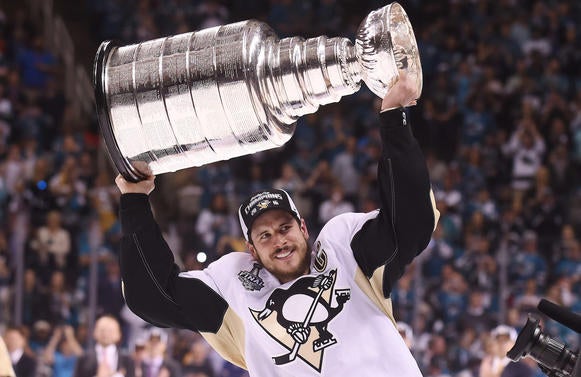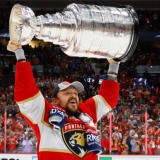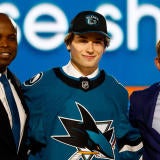Now that they have won the 2016 Stanley Cup, the days of looking at the Pittsburgh Penguins and their core players as underachievers should be long gone.
We never should have been looking at them in that way to begin with.
When the Sidney Crosby and Evgeni Malkin era began a decade ago, expectations were almost immediately at an unrealistic and unreachable level. Following a four-year stretch where the Penguins picked in the top-three of the draft each year and came away with a bounty of players that included Crosby, Malkin, Marc-Andre Fleury and Jordan Staal, the popular belief was that they were on the verge of becoming a modern NHL dynasty that would win multiple Stanley Cups and be a consistent force in the NHL.
More than 10 years later it may not have resulted in the modern-day dynasty that was initially expected, but their core players have more delivered on their promise. Even if it has not always seemed that way.
When they went to back-to-back Stanley Cup Finals in 2008 and 2009, winning it in the latter year, they seemed to be on their way to fulfilling those early expectations.
But with every postseason exit that followed that 2009 championship, including three first-round exits and two series where they let 3-1 series leads slip away, the disappointment seemed to grow. Quickly, the Crosby-Malkin era Penguins went from being the next great NHL dynasty to being labeled as underachievers for never getting back to the Final or winning it.
That includes criticism from within their own organization. Following the decision to fire former general manager Ray Shero after the 2014 season, team president David Morehouse mentioned "five consecutive years of underachieving hockey in the playoffs."
That is a rough label. Because Crosby, Malkin, Fleury and Kris Letang have been the four key players around for all of it, the blame almost always fell on them. What they did not do. How much money they made. Should one of them be traded? It was a yearly ritual.
But thanks to their 3-1 win over the San Jose Sharks on Sunday night to win the fourth championship in franchise history and the second in the Crosby-Malkin era, the underachiever label is gone forever.
Just consider what this team has done since the start of the 2005-06 season when Crosby made his NHL debut:
- Their 486 regular-season wins are the third-most in the NHL (behind only San Jose and Detroit)
- Their 75 playoff wins are the second-most in the NHL over that stretch (trailing Chicago by one)
- They have appeared in three Stanley Cup Finals. No team has appeared in more (Chicago also has appeared in three)
- They have won two Stanley Cups, making them just one of three teams in the salary cap era to win more than one, joining Chicago and Los Angeles
That does not even get into the individual accomplishments where Crosby and Malkin have combined to win three MVP awards, two Conn Smythe trophies, four scoring titles, and have been the two most productive and dominant offensive players in the league in both the regular season and playoffs (they are the top two players in points per game in both since they entered the NHL).
That is delivering. That is building a franchise that is consistently competitive and a contender for the Stanley Cup.

Expectations can be a tricky thing, and at times they can be completely arbitrary, whether they are set by the media, fans or even by the teams themselves. When players or teams fail to reach the level we think they should, we rip them for failing to reach a level we set for them. It can be a vicious cycle.
When they initially entered the NHL, Crosby and Malkin were not your run-of-the-mill top draft picks. They were players that were identified early on as franchise building blocks and the type of players that could turn a team around almost instantly. Players you should be able to win championships with.
But when those early expectations were being built it was almost as if nobody took into account what impact the salary cap (which was still a new thing at that time) would have on the NHL.
Nobody took into account the simple fact that winning the Stanley Cup even once, let alone multiple times, is a damn hard thing to do, and that it not only requires top-line superstar players, but also quality depth, a little bit of good luck along the way on the ice, and a lot of luck when it comes to health.
It did not take into account that sometimes you just run into a team that is simply better.
The Penguins experienced all of that over the past seven years.
Whether it was running into a stunning goaltending performance from Jaroslav Halak in 2010 (after he single handedly beat the Presidents' Trophy winning Washington Capitals in the first round), or playing without Crosby and Malkin in 2011, or having three of their top-four defensemen sidelined in 2015, or just simply not having anywhere near a good enough supporting cast (pick any of their teams between 2013-2015).
The funny thing here is that for as tricky as expectations can be, reputations are the same way.
Now that Crosby and Malkin have their second championship it is going to forever change the narrative about them and their careers. There is probably going to be some perception that they did something to change, whether it be their style of play, leadership or any other other intangible thing (clutch goal scoring, maybe?) that we can not account for.
The reality, though, is that nothing changed with them. They did what they always do.
They were the best players on the ice, they controlled the game, scored points and made their linemates better. The point totals may not be what they were for them back in 2008 or 2009, but that has more to do with them being older and how difficult it now is for top players to score in the NHL.
The difference with this Penguins team is that everything else around Crosby and Malkin changed.
Phil Kessel, Nick Bonino and Carl Hagelin gave them a third line that no team in the NHL could match up with, while they also had a fourth line behind that that could chip in the occasional goal. No matter how good they are, your superstar players are not going to score every night. Sometimes they are going to get shut down for a few games -- especially in the playoffs -- and you need to have other players that can pick up that slack. This team had that element.
They received better goaltending than they sometimes did in recent years, and other than the injury to defenseman Trevor Daley in the middle of the Eastern Conference finals, they were a pretty healthy team at the right time of the year.
Because all of that changed we are going to look at Crosby and Malkin a little bit different now that they won this Cup. We should not. They have always delivered what the Penguins needed.
The difference this year is that the Penguins gave them what they needed to get back to a championship level.


















